“We are going to send a strongly-worded letter to Reuters tomorrow,” said Helga Baagö at SVT to news agency TT on Sunday.
The letter will be signed by SVT head Eva Hamilton.
“We will outline just how we think they have handled this,” Baagö said.
The agencies had bought 90 seconds of film material from the wedding ceremony inside the church but reacted angrily to the clause that they were only permitted to use the clip for 48 hours and in the end elected to boycott coverage of the wedding entirely.
AFP published a statement to its subscribers on Saturday afternoon, shortly before the wedding ceremony was due to start, saying that “due to restrictions by Swedish public television SVT on images of the marriage … (AFP) will not distribute text, photos, or videos” of the event.
Christine Buhagiar, who heads AFP’s video service AFPTV, was quoted as saying that the amount requested by SVT “largely surpasses the market price,” while SVT has meanwhile insisted that the price was “standard.”
Sweden could have lost valuable publicity over the boycott and many articles penned by smaller agencies were later published without pictures as a result.
The foreign ministry had been allocated extra funds to distribute information about Sweden in connection with the wedding, work which was complicated by the boycott.
The broadcasting rights were negotiated between the Royal Court and SVT, who then struck a deal with the major international media agencies.
But when the four parties sat down to sign the contracts, the agencies reacted strongly to the 48 hour restriction on the use of the filmed material.
The agreement with SVT would, according to the agencies, have meant that many viewers in Europe and North America would not have been able to see the footage until several hours after the wedding ceremony.
The three agencies contacted the Royal Court on Saturday morning in the hope that it would intervene, but to no avail.
In an email addressed to the head of communications at the Royal Court, Nina Eldh, the agencies said that “owing to the impasse over unrestricted television news access to today’s wedding ceremony, Reuters, AFP and the Associated Press have decided to withdraw from coverage of the event.”
In the email, also copied to Prime Minister Fredrik Reinfeldt, the agencies said they “will not be distributing still pictures, text or video reports relating to it anywhere in the world.”
“We have made this decision reluctantly and at great cost both to ourselves and our subscribers,” they said, calling on the court to come with “any suggestions you might have as to how the situation could be resolved.”
AFP global news director Philippe Massonnet said “this battle aims to enable us to better inform the public.”
He went on to decry “the increasingly commercialised use” of large events by their promoters.
“This has become common in sports but now affects all kinds of events, especially involving celebrities,” he said.
But Helga Baagö has rejected the arguments and arguing that it is clear why the agencies acted like they did.
“They are trying to raise the stakes to create new future possibilities for earning money, by trying to argue that they should have the rights at a lower price or without any restrictions – so that they can continue to sell the material on to their customers,” she said.



 Please whitelist us to continue reading.
Please whitelist us to continue reading.
Member comments